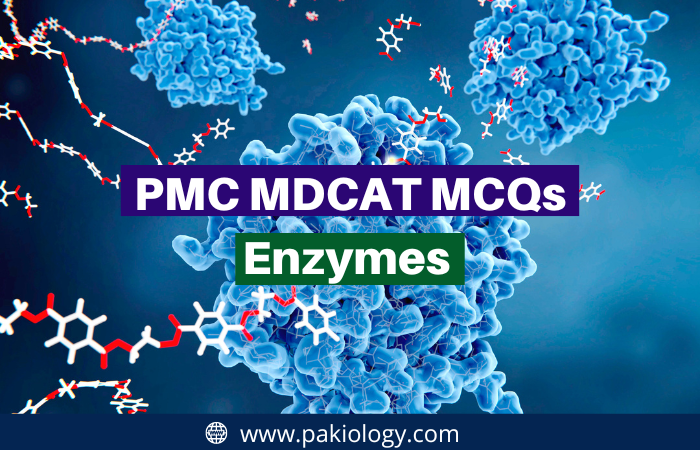A collection of MCQs on the topic of Enzymes Structure and Function. These questions are selected from PMC paid practice tests and various competitive exams and are quite similar to the ones being asked in the exams. This quiz contains a total of 121 questions, covering all important topics related to Enzyme’s Structure and Function, with detailed explanations given along with each answer. Go through these questions carefully and try to attempt all of them! Answers to these questions will be provided at the end of each question.
PMC MCQs On Enzymes
These MCQs are prepared from the PMC paid practice tests. The Practice Tests include questions on enzymes, structure and function of enzymes, the substrate specificity of enzymes, classification of enzymes, metabolism, enzyme kinetics and regulation of enzyme activity.
Introduction of enzymes
An enzyme is a protein molecule that speeds up chemical reactions without being consumed by them. The purpose of enzymes is to lower the activation energy for various reactions. These reactions would be too slow if it were not for the help of enzymes, so the majority of living organisms owe their existence to these tiny proteins.
Characteristics of enzymes
Enzymes are proteins that act as biological catalysts. They help speed up the chemical reactions necessary for all life on earth. Without enzymes, living things would be too slow to grow, reproduce, and adapt to changing environments. They can either break down complex molecules or build simple ones from smaller molecules.
They have a specific shape that allows them to match like-sized molecules to work on them. The two structures of an enzyme are its active site and its substrate binding site. The active site is where the chemical reaction takes place, while the substrate binding site is where it connects with its matching molecule (substrate). Once these two meet, they form an enzyme-substrate complex which then acts as an intermediate product of the reaction. In most cases, enzymes make their reactions go faster by lowering activation energy so they happen at a lower temperature than they otherwise would if there were no catalysts present.
Mechanism of action of enzymes
Enzymes are proteins that catalyze the rate of chemical reactions in an organism. They are necessary for almost all metabolic processes, including the synthesis of DNA, RNA, amino acids, glycolysis, citric acid cycle and oxidative phosphorylation. The mechanisms by which enzymes work vary. In general, they increase the rate of a reaction by providing a new reactive site that produces or consumes a reactant. A binding site where catalysis occurs is called an active site; other sites on the enzyme may be referred to as allosteric sites or regulatory sites.
Factors affecting the rate of enzyme action
Enzyme action can be affected by the following factors: substrate concentration, temperature, pH, substrate type, enzyme affinity, and enzyme saturation point. An increase in any of these will cause a faster reaction rate. Temperature affects the rate of an enzyme’s activity because its heat-sensitive proteins are denatured when heated. The higher the substrate concentration, the more quickly it is used up and becomes unavailable to react with more substrates, thus leading to decreased reaction rates as it reaches its saturation point.
Enzyme inhibition
Enzyme inhibitors are commonly used to treat diseases because they prevent the action of the target enzyme. This is done by binding to a region near the active site, which then blocks access. Inhibitors can be reversible or irreversible. A well-known irreversible inhibitor is an insulin.
MCQs On Enzymes
Here are the MCQs from the PMC MDCAT on Enzymes.
- Chapter: Enzymes
- Total MCQs: 121



There’s no option to start the quiz🙄🙄
Yes. There is a problem with the quiz code we are working on it. INSHALLAH soon it will be ready for all quizzes.
how much time